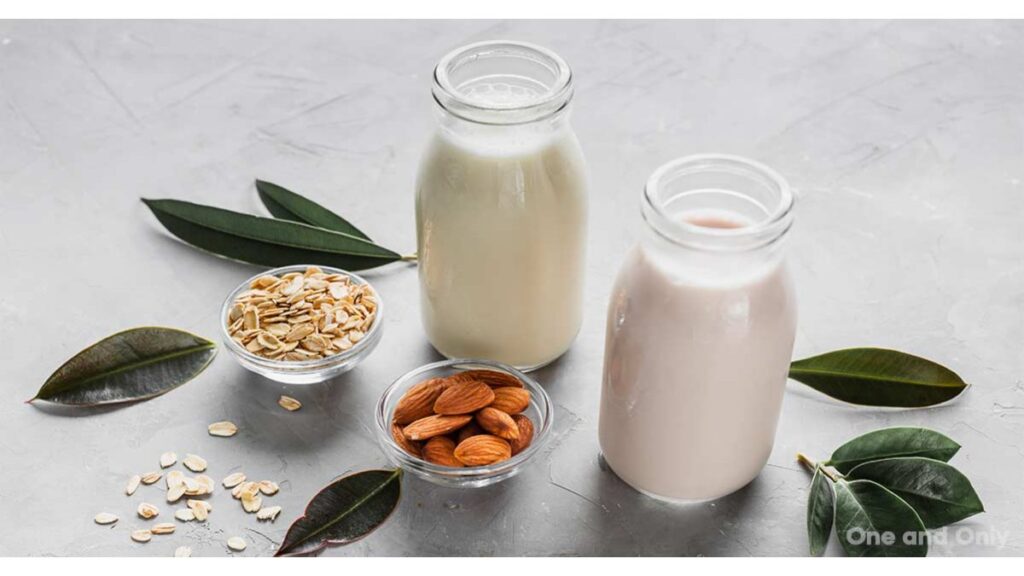In recent years, the popularity of plant-based milk alternatives has soared, with almond milk and oat milk leading the pack. These dairy-free options have become staples in many households, offering a delicious and nutritious alternative to traditional cow’s milk. Did you know that the global almond milk market is projected to reach a staggering $13.3 billion by 2025? Meanwhile, oat milk, once considered the underdog, has seen an explosive growth rate of over 700% in the United States alone in recent years. Clearly, these milk alternatives are not just a passing trend but a significant shift in our consumption patterns. But here’s the burning question: Are almond milk and oat milk truly healthier options, or is one superior to the other? In this edition of One & Only Health Tips, we’ll break down the nutritional benefits and potential drawbacks of both almond milk and oat milk to help you make an informed choice for your dietary needs.
Almond Milk: The Nutrient-Packed Elixir
Almond milk, derived from crushed almonds and water, has become a favorite among those seeking a dairy-free milk alternative. Here are some of the key nutritional benefits of almond milk:
- Low in Calories: Almond milk is naturally low in calories, making it an excellent choice for those looking to maintain or lose weight.
- Heart-Healthy: It is also rich in monounsaturated fats, which are known to support heart health by reducing bad cholesterol levels.
- Nutrient Boost: Almond milk is often fortified with essential nutrients like calcium, vitamin D, and vitamin E, making it a nutritionally sound option.
- Lactose-Free: Almond milk is naturally lactose-free, making it a suitable choice for individuals with lactose intolerance or dairy allergies.
However, it’s essential to consider that almond milk may not be suitable for those with nut allergies, as it contains almonds.
Oat Milk: Creamy and Nutritious
Oat milk is another popular plant-based milk alternative, made from whole oat grains blended with water and often enriched with vitamins and minerals. Here are some of the nutritional advantages of oat milk:
- High in Fiber: Oat milk is naturally high in dietary fiber, which is great for digestive health and can help you feel fuller for longer.
- Heart Health: The beta-glucans in oats have been shown to lower cholesterol levels and support heart health.
- Fortified Options: Like almond milk, many oat milk products are fortified with essential nutrients such as calcium and vitamin D.
- Dairy and Nut-Free: Oat milk is an excellent choice for those with nut allergies or lactose intolerance.
Comparing the Two: Almond Milk vs. Oat Milk
Now that we’ve highlighted the individual benefits of almond milk and oat milk, let’s compare them head-to-head:
1. Caloric Content
Almond milk typically has fewer calories than oat milk, making it a better choice for those looking to cut calories.
2. Nutritional Value
Oat milk tends to be higher in carbohydrates and fiber due to the oats, while almond milk is richer in healthy fats.
3. Taste and Texture
Oat milk has a creamier texture and a naturally sweet flavor, making it a versatile choice for coffee, cereal, and baking. Almond milk has a nutty flavor that works well in smoothies and desserts.
4. Allergies
If you have nut allergies, oat milk is the safer option, as almond milk contains almonds.
5. Environmental Impact
- Almond milk has a smaller carbon footprint compared to cow’s milk, but oat milk may have an even smaller one. A study found that the greenhouse gas emissions from oat milk production are about 80% lower than those from cow’s milk, making it a potentially greener choice.
- It takes a staggering 1,611 gallons (6,098 liters) of water to produce just one gallon of almond milk. In contrast, oat milk is significantly more water-efficient, requiring only around 48 gallons (182 liters) per gallon.
Conclusion
To produce one gallon of almond milk, it takes approximately 128 almonds. On the other hand, oat milk requires roughly 75 oats to make the same amount. Ultimately, the choice between almond milk and oat milk comes down to your personal preferences and dietary needs. Both options offer numerous benefits and can be part of a healthy diet. Almond milk is lower in calories and higher in healthy fats.
